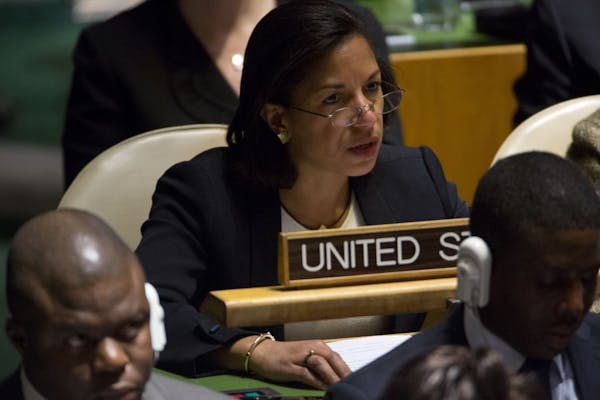The Palestinians have pursued another fruitless course by unilaterally seeking non-member status in the United Nations last week.
Over the great sweep of history, the United States has proven to be the necessary and indispensable party to diplomacy. Only America has the might and credibility to work with all parties to change the landscape of the Middle East for the better.
Egypt's experience is a leading example. In the 1960s, President Gamal Nasser adopted a bellicose attitude toward Israel and the United States and aligned Egypt with the Soviet Union. The result was Egypt's humiliating defeat in the 1967 Six Day War.
Nasser's successor, President Anwar Sadat, restored a measure of Egyptian self-respect in the Yom Kippur War. It was only engagement with the United States that returned the Sinai to Egypt via a 1978 peace treaty with Israel.
Indeed, it was Secretary of State Henry Kissinger's blunt assessment to the Egyptians (and Israelis) that, with their forces intertwined in the aftermath of the 1973 war, they had no choice but to deal directly with each other to disengage militarily. When Sadat said yes, Kissinger described it as a miracle to Israeli Prime Minister Golda Meir. But it required excruciatingly delicate U.S. shuttle diplomacy to make it work.
Unfortunately, strong U.S. support for President Hosni Mubarak kept him in power long after he lost the consent of his people. However, Mubarak's commitment to maintaining peace between Egypt and Israel, as well as protecting Egypt's Coptic Christian minority, should not be forgotten and remains vital for President Mohamed Morsi's Muslim Brotherhood government as well.
Immediately after assuming power, Morsi's embrace of Iran undermined the United States and the chances for Middle East peace. This has led to an emboldened Hamas accelerating its missile attacks on Israel, which provoked a serious Israeli military response with reverberations internally for Egypt. Again, a U.S. secretary of state, Hilary Rodham Clinton, played a leading role in lowering the temperature and making sure American influence supported Egyptian cease-fire negotiations.
The unrest sparked in Egypt by the conflict in Gaza, flowing from Morsi's démarche to Iran, has now led back to the beginning. Morsi's attempt to consolidate his power in a manner similar to Mubarak has led even an Islamist government into trouble in the streets of Cairo.
The Palestinians, for their part, have erred numerous times with respect to relations with the United States and its diplomacy. Exhaustive efforts at Camp David in 2000 with President Bill Clinton were met with the ultimate rejection of the second intifada of violence and bloodshed. In 2008, President Mahmoud Abbas, like Yasser Arafat before him, also rejected (never responded) to a proposal which would have established a Palestinian state in 94 percent of the West Bank. Israel would have given the Palestinians land from Israel roughly equal to the settlement blocs retained by Israel in a final agreement.
The Palestinians should seek a return on the decades of efforts of U.S. presidents and secretaries of state to bridge the most difficult issues between Israel and themselves.
In short, the path to a Palestinian state lies between Jerusalem and Ramallah and Ramallah and Washington as it once did between Cairo and Jerusalem and Cairo and Washington.
Instead, the Palestinians' move in the U.N. was publicly criticized by the United States, Canada, Britain and Germany. It will change nothing on the ground because it was directed at the General Assembly in New York and not the Knesset in Jerusalem. It will produce disdain from an Obama administration that just weeks ago invested heavily in defusing the Gaza situation.
The Egyptian example remains instructive. Working with, and not against, the United States succeeds. For the Palestinians, only the United States has the capacity through diplomacy and creativity -- in conjunction with other well-meaning parties -- to solve the great issues outstanding between Israelis and Palestinians.
All other paths are dead ends.
* * *
Steve Hunegs is the executive director of the Jewish Community Relations Council of Minnesota and the Dakotas.

